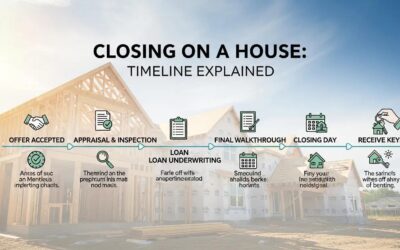Florida’s 2025 real estate commission reforms significantly change how buyers and sellers pay for real estate services. These reforms started as a way to make home-buying and selling more transparent and fair. One significant change is that buyers and their agents must now have a written agreement that clearly outlines how the agent is paid. Also, buyers must negotiate their agent’s commission separately from the seller’s costs, which means they may have to pay upfront instead of having it included in the home price.
These real estate commission reforms are already affecting the Florida market. For example, home sellers now have more control over how much commission they offer, which could lead to lower overall costs. In another case, buyers who don’t plan may struggle with upfront agent fees, making it harder for first-time or lower-income buyers to afford professional help. According to industry experts, these changes could lower commission rates by up to 30%, making home transactions more cost-effective for some.
For most buyers and sellers, working with an experienced real estate agent is still the best way to navigate these changes. A skilled agent can help negotiate fair terms, find creative financing options, and ensure a smooth transaction. While the reforms bring new challenges, they also create opportunities for buyers and sellers to make smarter financial choices. With the proper guidance, purchasing or selling a home in Florida can still be a rewarding and successful experience!
Key Takeaways
- Buyers must now sign written agreements with agents before property viewings, outlining service scopes and compensation terms to ensure transparency.
- Buyers are responsible for negotiating and paying agent commissions directly, leading to potential upfront costs exceeding $10,000.
- Sellers should negotiate commission rates directly with agents, favoring performance-based incentives to maximize net proceeds from the sale.
- Clear documentation is essential to avoid legal disputes, emphasizing the importance of detailed fee agreements between buyers and agents.
- Increased upfront costs may challenge lower-income buyers, potentially affecting their negotiation power in a competitive market.
Overview of the 2024 Commission Reforms
The 2024 reforms implemented by the Florida Property Commission introduce substantial changes to the state’s property commission structure aimed at enhancing transparency and fairness in transactions. Key alterations include the decoupling of buyer-agent compensation from seller fees and the requirement for written agreements between buyers and their agents prior to property viewings. MLS listings will no longer display buyer-agent compensation terms, emphasizing a shift toward independent negotiation.
These reforms impose direct financial responsibility on buyers for agent commissions, potentially increasing upfront costs. While sellers benefit from not directly paying buyer-agent commissions, they must negotiate compensation independently. In general, the reforms aim to foster a more competitive market through transparency and revised negotiation strategies, significantly impacting both buyers and sellers in Florida.
This shift may lead to increased competition among agents, ultimately affecting commission rates in the state. Furthermore, understanding local realtor benefits will be crucial for both buyers and sellers as they navigate this new landscape.
Changes in Buyer-Agent Compensation Structures
Significant changes have emerged in buyer-agent compensation structures as a result of the 2024 Florida Authentic Estate Commission reforms. Buyers now bear the responsibility of negotiating and paying their agent’s commission directly, a departure from the previous model where sellers funded both agents. This shift mandates written agreements detailing fees and compensation terms before entering a purchase agreement, enhancing transparency.
Additionally, buyer’s agent commissions are no longer listed on the Multiple Listing Service (MLS), further altering the landscape of real estate transactions. Buyers may incur upfront costs exceeding $10,000, which could strain financial resources, especially for first-time homebuyers. Moreover, agents must provide itemized fee schedules, complicating transaction management.
To navigate these changes effectively, buyers must thoroughly assess their financial health and understand the Debt-to-Income (DTI) ratio. While direct negotiations may lead to lower commissions, actual savings are influenced by market dynamics, necessitating a deeper understanding of the new financial landscape for effective decision-making.
Seller Responsibilities in Negotiating Commissions

Sellers now bear a crucial responsibility in negotiating commissions with their listing agents, reflecting the broader changes introduced by the 2024 Florida Genuine Estate Commission reforms. This shift enables sellers to take an active role in determining their financial outcomes during property transactions.
- Direct negotiation of commission rates with listing agents is fundamental.
- Performance-based incentives may be utilized to improve agent motivation.
- Sellers must consider the balance between agent fees and their net proceeds, as working with a good listing agent can significantly impact their overall profit.
- Transparency in commission disclosures is now legally mandated, which promotes greater clarity in the commission negotiation process.
Through these responsibilities, sellers can navigate the complexities of commission negotiations, ensuring that they align their interests with market dynamics and ultimately maximize their selling experience.
Understanding Written Agreements for Buyers
Written agreements are essential for buyers in Florida’s genuine estate market, as they establish clear expectations and responsibilities between agents and clients. Key components of these agreements include service scope, compensation models, and potential consequences for non-compliance. Understanding these elements not only improves transparency but also enables buyers to navigate the complexities of property transactions more effectively.
Given that Florida has the highest number of realtors in the U.S., these agreements play a crucial role in ensuring that buyers receive the necessary guidance and support throughout their real estate journey. Additionally, being aware of credit score requirements can significantly impact a buyer’s mortgage options and overall purchasing power.
Importance of Written Agreements
Although many buyers may perceive verbal agreements as sufficient, the introduction of mandatory written buyer agreements in Florida underscores their critical importance in authentic estate transactions. Effective August 2024, these agreements not only provide legal enforceability but also improve clarity in the buyer-agent relationship.
- Written agreements document services and compensation terms, aligning with state laws.
- They prevent misunderstandings that can arise from verbal communication.
- Buyers gain protection against unfulfilled promises or undisclosed liabilities.
- Specificity in agreements fosters accountability, ensuring agents fulfill their obligations. Additionally, understanding the legally binding nature of these written agreements will further enhance buyers’ confidence in their transactions.
As Florida adopts this national standard, buyers are encouraged to adopt written agreements for a more secure and transparent actual estate experience.
Key Components to Include
The implementation of mandatory written agreements in Florida property transactions necessitates a clear understanding of their key components for buyers. These agreements establish fundamental terms that improve transparency and negotiation capabilities. In light of recent changes in real estate commission structures, buyers need to be aware of how these commission negotiations may impact their transaction experience.
| Key Component | Description |
|---|---|
| Mandatory Written Fee Agreements | Buyers must sign agreements before home tours commence. |
| Direct Commission Negotiation | Buyers negotiate agents’ fees upfront, increasing flexibility. |
| Improved Documentation Transparency | Agents disclose commission structures to both parties. |
| Transactional Implications | Clarity in agreements reduces disputes and may lower commissions. |
| Seller Considerations | Sellers can reject offers based on buyer-agent fee agreements. |
These components enable buyers to guide them through the property landscape with informed decision-making and aligned expectations.
Consequences of Non-Compliance
Failing to comply with the new regulations regarding written agreements can lead to significant legal, financial, and operational repercussions for genuine estate professionals in Florida. The absence of proper documentation can expose agents and sellers to diverse risks, resulting in misunderstandings and disputes over payment obligations. For instance, overall buyer-agent commissions remained stable even after the implementation of the new rules, highlighting the importance of clarity in commission terms.
- Legal action from clients due to lack of clarity in commission terms
- Inability to enforce payment claims without written contracts
- Increased likelihood of contractual disputes arising from vague agreements
- Operational delays and inefficiencies stemming from unclear compensation structures
These consequences underscore the necessity for genuine estate professionals to adopt stringent compliance measures, ensuring transparency and trust in transactions and ultimately fostering a dependable environment for buyers and sellers alike.
Implications for Lower-Income Buyers
The reforms in Florida’s actual estate commission structure pose significant challenges for lower-income buyers, especially regarding commission waivers and negotiation barriers. These buyers may encounter difficulties in securing favorable terms due to a lack of experience and resources, potentially limiting their access to professional representation. Moreover, the heightened competition among agents could further exacerbate disparities, as lower-income persons may struggle to navigate the evolving market landscape effectively.
Understanding local assistance programs can provide essential support to help these buyers overcome financial obstacles and secure housing.
Commission Waivers Challenges
While commission waivers may appear to provide an opportunity for lower-income purchasers to reduce upfront costs, they often exacerbate existing financial barriers that hinder access to authentic estate representation. These challenges create a cycle of disadvantage, limiting equitable access to homeownership.
- Buyers must pay agents directly, increasing upfront costs.
- Lower commissions do not effectively mitigate lump-sum payment obstacles.
- Unrepresented buyers face weaker negotiation power without professional guidance.
- Economic disparities widen as only financially stable purchasers can utilize transparent fee structures.
As a result, lower-income persons often find themselves excluded from the competitive actual estate market, reinforcing systemic inequalities and limiting their chances of successful homeownership. Addressing these challenges is critical for fostering an inclusive housing environment.
Negotiation Barriers Encountered
Although lower-income buyers may seek to navigate the housing market, they encounter significant negotiation barriers that further complicate their path to homeownership. Upfront financial burdens, including direct agent commissions, can exceed $10,000 for homes priced at $400,000, exacerbating affordability concerns. Furthermore, a lack of negotiation resources, such as standardized commission rates and transparent pricing, leaves buyers vulnerable to confusion and pressure.
Asymmetric information further complicates negotiations, as sellers benefit from capped liabilities while buyers face opaque fee structures. Behavioral economics also plays a role, with anchoring effects skewing perceptions of fair rates. These barriers collectively hinder lower-income buyers from effectively negotiating favorable terms, reinforcing existing disparities in the housing market.
Market Competition Effects
How does market competition impact lower-income buyers in the current genuine estate landscape? The recent commission reforms have intensified the challenges faced by lower-income buyers, resulting in several implications:
- Increased upfront costs can deplete savings needed for home purchases.
- Lower-income buyers may lack negotiation advantage, leading to disproportionately higher commissions.
- The absence of professional representation may cause unrepresented buyers to overpay or accept unfavorable terms.
- Market dynamics may shift, favoring cash-rich buyers and exacerbating wealth disparities.
As competition evolves, these factors create a landscape that may further marginalize lower-income buyers, underscoring the need for support and resources to navigate these changes effectively.
Strategies for Sellers to Evaluate Offers
What strategies can sellers employ to effectively evaluate offers in the evolving landscape of Florida’s genuine estate market? Sellers should prioritize offers with minimal contingencies, as these reduce the risk of deal failure. Evaluating the strength of buyer pre-approvals and earnest money deposits can indicate buyer reliability.
Moreover, sellers can negotiate buyer agent compensation, exploring performance-based incentives or capped commissions to control costs. Adapting to market shifts demands a focus on property appeal, such as modern amenities, while utilizing technology like automated offer analysis and 3D property scans improves the evaluation process. By considering accelerated closing bonuses and scrutinizing financing pre-approvals, sellers can make informed decisions that align with their financial goals.
Additionally, understanding additional homeownership costs can help sellers anticipate potential expenses that may arise during the selling process.
The Role of Transparency in Real Estate Transactions

As sellers adapt their strategies to navigate Florida’s shifting authentic estate landscape, the importance of transparency in transactions becomes increasingly evident. The evolving dynamics, especially with the role of transaction brokers, highlight the vital need for clear communication between agents and clients. Buyers and sellers must understand their rights and the implications of brokerage roles to avoid misunderstandings.
- Consumers often misinterpret transaction brokers as loyal representatives.
- Lack of disclosure can lead to negotiation risks.
- Buyers are now responsible for negotiating agent commissions upfront.
- Attorneys are recommended to use FTOs to safeguard interests during commission discussions.
- Understanding the role of buyer representation is crucial for ensuring that buyers’ needs are prioritized throughout the transaction process.
In this context, transparency fosters informed decision-making and helps build trust, which are fundamental components for successful authentic estate transactions in 2024.
Future Trends in Florida’s Real Estate Market
While the Florida genuine estate market continues to evolve, several emerging trends are shaping its future landscape. Recent data indicates a balanced environment with a modest increase in single-family home sales and a surge in inventory, providing buyers with greater negotiating power. Price stability reflects a potential for 3-4% annual gains, while overheated regions may experience corrections.
Urban areas, especially Miami and Orlando, are witnessing sustained demand despite affordability pressures from high mortgage rates and insurance costs. Furthermore, regulatory reforms aim to improve price transparency, influencing buyer and seller behaviors. As construction faces delays, builders are adapting through incentives, signaling responsiveness to shifting market dynamics and ensuring a more sustainable growth trajectory. The rise of remote work flexibility is also contributing to an increased interest in spacious homes with dedicated office spaces.
Frequently Asked Questions
How Will These Reforms Affect Home Prices in Florida?
The reforms are likely to create downward pressure on home prices in Florida, as reduced seller costs may prompt lower listing prices. Buyers face increased financial burdens, altering market dynamics and negotiation strategies.
Can Buyers Still Work With Agents Without Signed Agreements?
Buyers can work with agents without signed agreements; however, they lack representation. Agents are not obligated to prioritize unrepresented buyers’ interests, necessitating clear communication to avoid misunderstandings and guarantee all parties understand their respective roles.
What Happens if a Seller Refuses to Pay Agent Commissions?
If a seller refuses to pay agent commissions, buyer agents may seek alternative compensation methods. This could potentially lead to increased negotiation complexity and financial burdens on buyers, which would impact general transaction dynamics and market behavior.
Are There Penalties for Non-Compliance With New Commission Rules?
Penalties for non-compliance with new commission rules present potential pitfalls, including financial fines, legal liabilities, and licensing losses. Agents must adapt to avoid damaging their reputation, disrupting sales, or facing costly legal challenges in genuine estate.
How Can Buyers Find Agents Willing to Negotiate Fees?
Buyers seeking negotiable agents should prioritize those with flexible fee structures, experience in post-reform transactions, and a willingness to accept tiered pricing models. They should also utilize market conditions to improve their negotiation advantage effectively.
Conclusion
To sum up, Florida’s 2024 genuine estate commission reforms represent a significant shift in the landscape of property transactions, akin to a ship adjusting its sails to navigate changing winds. Buyers and sellers must adapt to new compensation structures and responsibilities, fostering a more transparent marketplace. By understanding these changes, all parties can better position themselves for success, ensuring that the expedition through Florida’s genuine estate market remains both informed and equitable for everyone involved.
References
- https://www.youtube.com/watch?v=ND0UUDSwNV0
- https://www.floridarealtymarketplace.com/blog/what-to-know-about-realtor-fees-in-florida-2024.html
- https://www.redfin.com/blog/florida-real-estate-commissions/
- https://www.firstcitizens.com/wealth/insights/intel/impacts-2024-real-estate-commission-changes
- https://www.kleinattorneys.com/navigating-the-new-real-estate-commission-laws-in-florida-what-buyers-and-sellers-need-to-know/
- https://www.tomdayproperties.com/blog/new-commission-rules-effective-aug-17-are-you-ready/
- https://theshavergroup.net/real-estate-commission-changes-2024/
- https://luxurylivingfortlauderdale.com/new-mls-rules-around-real-estate-agent-commissions-start-in-august/
- https://livefloridacoast.com/new-commission-model/
- https://www.nar.realtor/sites/default/files/documents/guide-to-upcoming-practice-changes-for-real-estate-professionals-2024-07-30.pdf







